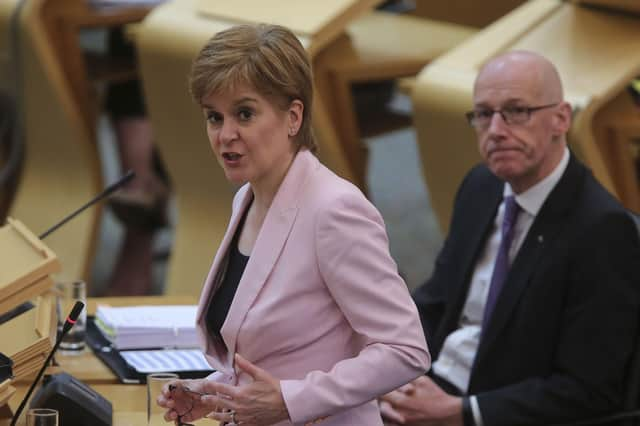Covid: Scottish Parliament must be able to scrutinise SNP Government's decisions over pandemic – Brian Wilson


How long before Parliament calls time on the arbitrary exercise of powers which restrict freedoms and inflict lasting economic damage?
To ask that question is in no way to deny the need for measures in the face of a pandemic – but to challenge the means by which these decisions are made; two very different concepts.
Advertisement
Hide AdAdvertisement
Hide AdA week ago, the same question could have been asked, UK-wide. Then something overdue happened. Enough Tory MPs threatened the Government’s majority to force promises of scrutiny and involvement.
The Speaker, Lindsay Hoyle, scarcely courts controversy but was firm on this occasion. The lack of scrutiny was “totally unsatisfactory”. Ministers should draw up measures in time for MPs to “debate and decide”. Though there was no vote, changes to behaviour were agreed.
Graham Brady, who led the Tory rebellion, said of the outcome: “It gives the British people reassurance that measures which restrict their liberty, interfere with family life and very often threaten their livelihoods will not be imposed without important questions being asked and answered in advance.”
As far as Scotland is concerned, Mr Brady is only partially right. The great majority of undebated edicts which people are having to deal with fall within devolved powers. Yet there is little sign of a similar will to stand up for Holyrood.
I heard the advocate, Niall McCluskey, talk about the “democratic deficit” which is now enshrined into the way Scotland is run. He is absolutely right but unless there are a few Nationalist MSPs prepared to stand up for the Parliament, this will continue.
Rule by a few individuals, mainly unelected, without democratic scrutiny, has not proved a huge success. It has given us the third-highest death rate in Europe, delusory nonsense about an “elimination strategy” and a welter of confusion, anomalies and unexplained “rules”.
The scandal of returning students would probably not have happened if debated in advance at Holyrood. There were MSPs trying to raise warnings over many weeks but there is no forum for any sustained argument that demands ministerial accountability.
Ms Sturgeon tells us it would have been better if the Eat Out to Help Out scheme had not happened, which is pretty breathtaking since it was crucial to survival for thousands of Scottish businesses. Mercifully, she did not have the power to stop it – but that is the exception which proves the rule.
Advertisement
Hide AdAdvertisement
Hide AdOn a whole range of restrictive measures, there are no requirements to produce evidence. In the absence of parliamentary scrutiny, objections can be swatted away. Yet every one of these issues would justify a day of debate at Holyrood. What else do they have to occupy them?
There are sectors of our society which go entirely undiscussed. For example, I heard this week from the Scottish Outdoor Education Centres who are now on the verge of bankruptcy and closure, having been completely ignored throughout the pandemic.
I was told: “The blindness to the effect this will have is bewildering. We have only had platitudes from Scottish Government and the initial resilience money came from Westminster. The loss to children and education is incalculable and the cost of new future provision will be huge.”
This is just one example of a part of Scottish society which deserves explanation, following open debate, about why its fate is being determined in this way – and if justification cannot be proven, then the treatment must change.
The answer from Ms Sturgeon (and until this week the Tories at Westminster) is that decisions must be taken at speed, making parliamentary scrutiny inappropriate. We accepted this in the early stages but it has worn thin.
Fiascos like the SQA results and students’ start-of-term evolved over months, not hours. Decisions, or lack of them, affecting forgotten sectors like outdoor centres have not been subjected to any scrutiny over a period of months, not days.
The optimistic assumption about any Parliament must be that it contains a range of expertise which can contribute to sensible outcomes, beyond party politics. Holyrood has allowed itself to be excluded from that role, thereby creating the “democratic deficit” while demeaning the institution itself.
A message from the Editor:
Thank you for reading this article on our website. While I have your attention, I also have an important request to make of you.
Advertisement
Hide AdAdvertisement
Hide AdThe dramatic events of 2020 are having a major impact on many of our advertisers - and consequently the revenue we receive. We are now more reliant than ever on you taking out a digital subscription to support our journalism.
Subscribe to scotsman.com and enjoy unlimited access to Scottish news and information online and on our app. Visit www.scotsman.com/subscriptions now to sign up.
Subscribe to the Edinburgh Evening News online and enjoy unlimited access to trusted, fact-checked news and sport from Edinburgh and the Lothians. Visit www.edinburghnews.scotsman.com/subscriptions now to sign up.
By supporting us, we are able to support you in providing trusted, fact-checked content for this website.
Joy Yates
Editorial Director
Comments
Want to join the conversation? Please or to comment on this article.